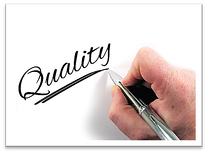 In many service businesses, the industry—not the client—defines quality. In advertising, when most creative people say, "That's a really good ad," they don't mean that the ad might build the client's business. They just mean that it has a good headline, good visual—it's good. Neat. Cool. Many architects treasure buildings that are enormously inconvenient for the people who work inside. Still, architects call them great buildings. Ask: Who is setting your standards—your industry, your ego, or your clients?
In many service businesses, the industry—not the client—defines quality. In advertising, when most creative people say, "That's a really good ad," they don't mean that the ad might build the client's business. They just mean that it has a good headline, good visual—it's good. Neat. Cool. Many architects treasure buildings that are enormously inconvenient for the people who work inside. Still, architects call them great buildings. Ask: Who is setting your standards—your industry, your ego, or your clients?
-Harry Beckwith, Selling the Invisible
What makes something "good" or even "great"? And the related question, "whose opinions should matter the most?" These are the questions Mr. Beckwith puts before us. As we create a new product or a service, we obviously have to use our own judgment to determine whether what we are developing is worthwhile or not, whether it is "good" or not, but ultimately, it is not our opinion that matters. It is the client, the end-user, whose opinion matters the most. This can get lost sometimes in the race for development or when we get caught up in the echo chamber within our industry, but if we follow these three development steps, we can keep our focus in the right place:
- Do thorough discovery to learn the client's needs before you ever start. If you are not developing for a particular client, but in general, do your research via survey or market analysis first.
- Incorporate periodic reviews into your development process to re-read the original client expectations and specifications and make certain you are meeting (or exceeding) all of them. Review the status with the client, too, when reasonable.
- Have a robust process in place for gaining customer feedback, both at time of initial delivery of the product or service as well as later in the client relationship time line.
Consistently following the above will not only enhance the current product/service being developed, but it builds our client knowledge for the future, giving us the opportunity to do more targeted marketing, to develop stronger products, and to build closer customer relationships.

